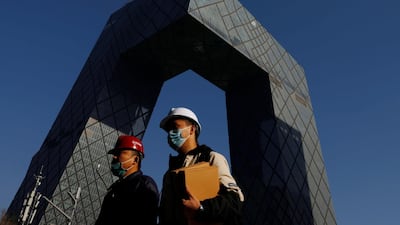The banning of the Chinese state television broadcaster from Britain has a delivered a strong message that state propaganda will not be tolerated in the UK, leading media experts said.
The decision by television regulator the Office of Communications (Ofcom) makes it possible that other state sponsored broadcasters could be targeted, such as Russia Today.
With the election of US President Joe Biden, there is greater appetite in Britain to speak out against state-sponsored channels that release questionable news highly partial to their countries.
Following endless pro-Chinese government reporting, Ofcom acted decisively to shut down CGTN on Thursday after its investigation found that the network was editorially controlled by the Chinese Communist party.
"This was a precise complaint on the basis of which Ofcom could legitimately and meticulously conclude that CGTN did not have the editorial independence which licensees require in the UK," leading media commentator Prof Tim Luckhurst told The National. "It's very clear that China is a surveillance state beyond George Orwell's imaginings and this was an egregious breach of licence. Britain is not seeking to be confrontational but it has retaliated effectively."
The CGTN channel has also been accused of forcing people, including human rights activists, to make confessions on air, reading from scripts provided by the Chinese authorities.
Ofcom’s finding is damaging to China’s state television broadcaster, which had planned to use London as a base to launch major international news operations.
British broadcasting laws require the body that holds the broadcast licence to have control over broadcasts, but CGTN’s licence holder, Star China Media Limited, does not have editorial responsibility for its content. Ofcom therefore ruled it cannot retain the licence.
The move was welcomed by former foreign minister Tobias Ellwood, MP, a strong critic of China’s undermining of the international rules-based system.
"What we've witnessed is China advancing its ability to communicate well beyond the region, so it's really good to see the authorities taking a more robust stance on China as it tries to rewrite international norms and standards," he told The National. "If this is your diet of news that you're receiving you're only going to get China's view of the world and China's interpretation. Freedom of the press is so important that it cannot be controlled by the state in the way that we see it with China."
His views were echoed by Prof Luckhurst, of Durham University, who while praising the great history and culture of the Chinese people labelled their government “a totalitarian regime, which has extraordinarily committed ambitions to extend its power and to assert itself in the world”.
The former editor of The Scotsman newspaper added: "There is widespread rejoicing amongst journalists and democrats throughout the rest of the world to see Britain actually sticking to its principles and applying a sensible approach to those who seek to abuse the values of Western democracy, to exploit our liberalism and to impose their poison on us."
Ofcom revoked the licence of the Iranian state broadcaster Press TV in 2012 for breaching the Communications Act after it found the channel had editorial oversight from Tehran, again in breach of broadcasting licence rules in the UK.
However, in 2017 Ofcom cleared Al Jazeera of anti-Semitism and breaching impartiality rules after the channel made an undercover investigation that found an Israeli embassy official plotting to “take down” British MPs seen as unfriendly towards Israel.
It is not known yet if Ofcom, following the China ruling, is set to take a closer look at the Russia Today channel broadcast from London for its alleged ties to Moscow.
“Russia Today has shown that if it has editorial independence then the editor is a very determined supporter of Vladimir Putin,” said Prof Luckhurst. “It’s entirely unlikely to genuinely have any such independence and I would not be remotely surprised if Ofcom moves against it as well, as Russia Today remains on air despite multiple breaches.”
It is understood that Ofcom has previously looked at RT’s fitness to hold a licence but, although it accepts that the station is funded by the Russian state, the licence holder, TV Novosti, is not controlled by a political party.
Ofcom would not comment on whether RT will be investigated further.


